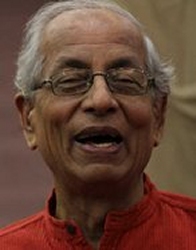Narthaki

News

Info

Featured


|   |
 e-mail: ukb7@rediffmail.com Masks marking obscurantism Photos courtesy: Creative Dance Workshop May 22, 2018 Chhau dance that originated in the Purulia district in West Bengal and drew inspiration from martial arts and combative training has been used, down the corridors of time, as a means to portray mythical battle stories to the audience, which is why elaborate masks and headgear associated with fights and war are worn during the performance. Listed on UNESCO's world heritage list of dances, Purulia Chhau -- apart from being influenced by military movements -- was also influenced by a combination of regional dances. Their costumes were influenced to the extent of using more interesting clothes or fabrics to create the ensemble as well as using elaborate masks that were extremely creative. As their faces are covered by masks, dancers per force emote through body language.
Taser Desh (Kingdom of Cards) performed by Creative Dance Workshop on May 13 in Kolkata, provided a brilliant idea to use the creative idiom of Purulia Chhau to visualise the dance drama penned by Rabindranath Tagore in 1933 and dedicated to Netaji Subhash Chandra Bose. The Tagore play takes a long, hard look at tyranny and regimentation and celebrates freedom of speech, thoughts and deeds. In the story, the prince lives in exile with his mother - the abandoned queen, along with the merchant's son as his only friend. Bored by their claustrophobic and monotonous existence in a dilapidated castle, the duo sets upon a long voyage. Sailing on the high seas, they get ship-wrecked and find themselves swept ashore on the Kingdom of Cards. In this strange land, the Cards are bound by countless innate "inhuman" rules. The story unfolds showing how the prince and his companion bring about an air of liberation and rebellion, making the Cards revolt and eventually break the shackles of tyranny. Competently directed by Shelly Paul and choreographed by Sharmila Banerjee, the essentially fantastic story comes out well with two sets of characters: the aesthetically-attired prince and his travel companion using creative dance style on one side and the minions of the Card Kingdom -- club, spade, heart and diamond culled from the card game - masquerading in mobile human forms on the other side. The latter's dance form in gaudy masks - with waist bands and hand amulets carrying their card identifications -- is executed in characteristic Chhau uflis and movements with head shakes, neck jerks, arm bends and diagonally stretched steps. The setting of the Card kingdom is left empty and open to audience imagination. The rousing conflict is between the wayward, happy-go-lucky prince and this stodgy group, chaperoned by their rule bound king. The plot thickens when the Card women begin breaking rules and the precipice of the Cards Kingdom - with its age-old pinnacles of ossified rituals and built-in prejudices - collapses. The play is from the point of view of the freedom loving prince who eventually "liberates" the whole kingdom, not excluding its king. The tone throughout remains one of biting irony and the prevailing mood, therefore, is entirely iconoclastic.
One notes that Taser Desh is, on balance, an emphatic statement by Tagore that no socio-political system could carry on indefinitely by basing itself on a web of soulless and meaningless set of regulations. And no such superstructure of rules of tyranny and rituals of blind observance - imposed on society by the powers-that-be -- could be everlasting. Such an imposition is bound to crumble down one day at the flimsiest of resistance. Interestingly in the dance drama, the prince was able to remove the cobwebs of the Cards Kingdom, not through brute muscle power or through any innate craftiness, but simply through the open defiance by the female populace - itself a first - through an abounding message of joy and infectious fearlessness that touched one and all in the establishment. Kudos are due to Creative Dance Workshop for reminding the viewers that relevance of the dance drama's inherent message cannot be entirely lost even in our own fractured times.  Dr. Utpal K Banerjee is a scholar-commentator on performing arts over last four decades. He has authored 23 books on Indian art and culture, and 10 on Tagore studies. He served IGNCA as National Project Director, was a Tagore Research Scholar and is recipient of Padma Shri. Post your comments Please provide your name and email id when you use the Anonymous profile in the blog to post a comment. All appropriate comments posted with name & email id in the blog will also be featured in the site. |